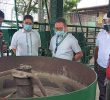By Isagani dela Paz
OFW Journalism Consortium
MANILA � The sparkle of billions of dollars of money sent by Filipinos temporarily or permanently earning abroad is blinding government and the overseas labor deployment industry, a lawmaker warned recently.
�The immediate windfall from the foreign currency remittances of our countrymen overseas makes it so easy to gloss over the reality that the diaspora of our skilled labor exacts a painful toll on the basic industries that should form the building block of a strong Philippine economy,� Congressman Roseller Barinaga said in a privilege speech recently.
Representative Barinaga of Zamboanga del Norte spoke at the Lower House seeking measures to check what he said was the unregulated outflow of critical skills and talents affecting the country�s strategic industries: aviation, electronics, shipping, steel, petrochemical, and telecommunications.
These are mission-critical personnel, meaning these are professionals whose skills are vital in flying and maintaining the safety of planes, in keeping the electronics, steel and petrochemical factories humming and in keeping our ships floating safely at seas, Barinaga explained.
In his speech titled �The silent crisis: The hemorrhage of mission-critical skills,� the House Labor Committee chair cited the Philippine aviation industry as example of the crisis brought by labor outflow.
Barinaga cited that while there are only 700 commercial pilots actively employed by the industry, the Philippines continues to allow the exodus of these highly-skilled workers, threatening the supply of pilots for domestic needs.
�What is distressing news for us is that the growth in aircraft fleets is not matched by provisions for training new personnel to man these fleets of new aircraft,� Barinaga said.
He noted that since aviation industries in other countries are �heavily subsidized by their respective governments, they can easily offer double or even triple what wage packages are offered by our local employers.�
Barinaga�s warnings come at a time when the global aviation industry is leaping from a slump in travel especially after the United States restricted cross-border and trans-border flights. Likewise, the growth of Asian countries like China and developing economies, coupled with the entry of airlines that slashed travel costs by half, boosted the aircraft manufacturing sectors.
Take-off
Hence, Barinaga explained that these developments prompted an increase in recruitment of aviation industry personnel.
Citing the Airbus Global Market Forecast in 2004, Barinaga says aviation growth until 2023 will need 23,500 pilots per annum, 6,000 of which will be in Asia-Pacific.
The orders include aircraft painters, ticketing and reservation agents, and even airport representatives, he added.
The same study by Airbus predicts that for the period 2004 to 2023, passenger traffic will grow by five percent every year. This will require a delivery of 16,601 new passenger aircrafts.
A compilation of aircraft orders from aviation trade magazines indicate within the current decade 279 aircraft will be delivered to seven airlines of India; 233 aircraft to 11 airlines of China and 77 aircraft will be delivered to three airlines of the Middle East.
For the Philippines, this meant increasing demand for aviation personnel: �It is evident that for these airlines, the pilots, aircraft mechanics, and other mission-critical personnel of the Philippine aviation industry are ripe for the picking.�
Barinaga said that the poaching of commercial pilots, aircraft mechanics, and other critical skills in the local aviation industry have increased in the past five years.
�The poaching practices have become a cottage industry all its own with recruitment agencies serving the interest of their overseas principals and focusing their sights on our technical manpower particularly pilots and mechanics,� Barinaga added.
He cited an agency specializing on recruiting for MROs in Singapore, another for principals in the Middle East, Taiwan, and Saipan.
�Still, some head hunters have lodged themselves in some plush hotels in Metro Manila and surreptitiously entice our mission-critical skilled workers for outright hiring,� the lawmaker said adding that �[i]f left unchecked, this invasion will cripple not only the aviation industry but also topple the pillars of national economy.�
Flight
The aviation industry is comprised of two segments. The first is composed of airlines consisting of scheduled and unscheduled carriers, charter and air taxi operators, and the general aviation sector. The second segment is composed of service providers consisting of the maintenance, repair, and overhaul organizations (MROs), ground handling agents, caterers, ticketing and reservations agents, terminal services both for passengers and cargo, and aviation schools, among others.
Philippine-based MROs include Lufthansa Technik Philippines, Aviation+, and Miascor, and directly employs 15,000 workers.
Daily, 25,000 passengers and almost 500 tons of cargo traverse the 31 international and 21 domestic destinations of Philippine flag carriers. The Philippines has a network of four international airports, four alternate international airports, 12 trunk line airports, 36 secondary airports, 29 feeder airports and over 200 airstrips all over the archipelago from Basco, Batanes to Jolo, Sulu.
Barinaga cited that for each full-pledged aircraft mechanic, the training investment would have been at least P2.5 million in the basic training modules that are required and prescribed by authorities over a period of at least five to six years.
For pilots, the training investment is much more since for a First Officer, the individual training investment is more than P8 million and at least six to seven years of experience.
Because other countries� aviation industries need a pre-qualified staff ready to jump-start their expanded fleets, the recruitment policy is to harvest the pick of the local aviation personnel, Barinaga explained.
�This deals a heavy blow to our domestic aviation industry,� he added.
Citing data from the Philippine Overseas Employment Administration (POEA), Barinaga said that in the past five years, 1,159 aircraft mechanics and technicians have left the country.
These are in addition to those who were directly hired by foreign employers thus evading the POEA count, he added.
Barinaga said an airline executive reported that for the past five years beginning 2000, 28 of their pilots left their employ every year for overseas work.
Stopovers
Still, Barinaga fell short of calling for an immediate ban on overseas deployment of aviation workers and other mission-critical personnel.
However, he asked executives of several government departments and agencies to study the possibility of imposing a temporary suspension or ban on certain critical skills and talents.
�I am referring to the commercial pilots, aircraft mechanics, painters, planners, ground and cabin crews for the domestic aviation and airline industry, information technology engineers and technicians for the electronics industry, ship engineers and technicians for the shipping industry, metallurgical and plant engineers for the steel industry, chemical engineers for the petrochemical industry, radio frequency engineers for the telecommunication industry and other technical and professional staff of other industries.�
Barinaga cited Sections 5 and 31 of the Migrant Workers Act of l995 (Republic Act 8042) that allowed for suspension or banning deployment of migrant workers �in pursuit of the national interest or when public welfare so requires�.
However, Jong Serreno of the Petrochemical Industry Association of the Philippines said that it is the aviation industry that is more at risk than the petrochemical sector.
Still, as member of the nongovernment Fair Trade Alliance (FTA), Serreno said he supports the view there are severe labor shortages in these industries that deserve serious action from government officials.
FTA convenor for labor Angelito Mendoza cited that if government fails to take action on the country�s unregulated outflow of critical skills and talents, �[t]hese industries will stop, and with that, foreign multinational companies could easily take over companies and businesses in these vital sectors of our economy.�
�I believe that after three decades of deploying Filipino skills overseas, we should set things aright by choosing primordial national interest over the short-term relief the remittances provide,� Barinaga said in Congress early February.
He demands a re-examination of the overseas deployment policy and the imposition of a moratorium, or suspension of overseas deployment of these mission-critical skills. (OFW Journalism Consortium)










